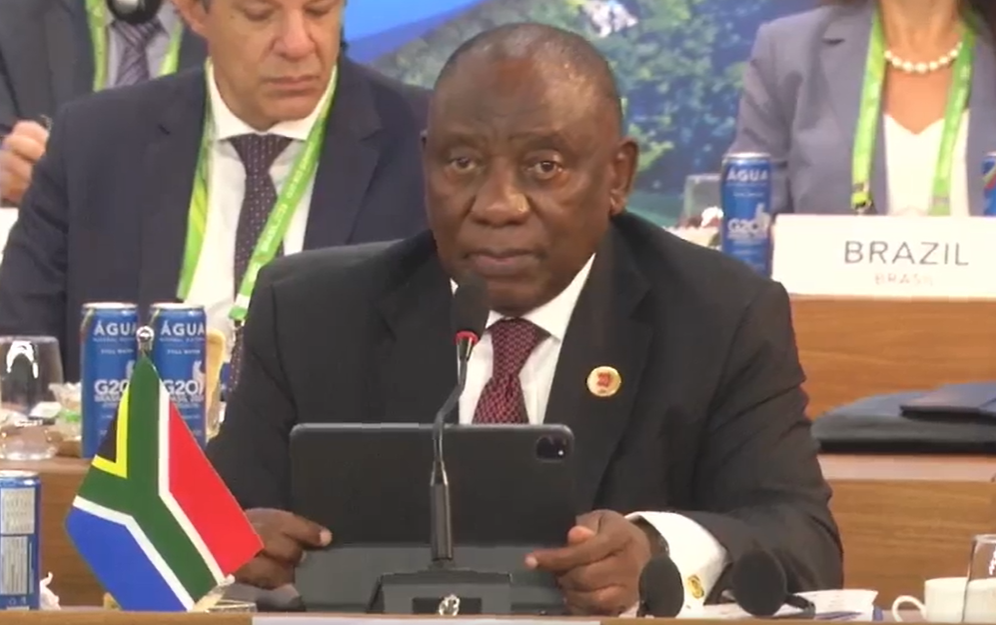
World

Ramaphosa puts Israel bashing on G20 agenda
All eyes will be on South Africa in 2025 as it hosts the Group of 20 (G20) leaders of the world’s most significant economies next November. Judging from what President Cyril Ramaphosa said at this November’s G20 Summit in Rio, he will seek to bring the Palestinian issue onto the G20’s packed agenda. South Africa has made “solidarity” a guiding principle for its chairing of the summit. Among other things, this appears to be code for maligning Israel. The SA Jewish Report spoke to some analysts to get their take.
Ramaphosa stressed the centrality of the United Nations (UN), and said that all states must comply with international law, with no exceptions. “The people of Palestine have been denied their right to self-determination and are under the yoke of a brutal and violent occupation. As the G20 collective, we need to add our voices to ensure that the carnage that is taking place in Gaza is ended and that we work towards a just and lasting peace for both Palestinians and Israelis.” The UN should counter the use of starvation as a weapon of war, Ramaphosa said, which was what Israel was doing in Gaza.
Funnily enough, Ramaphosa didn’t mention that Russia should follow international law with regard to its invasion of Ukraine. He seems determined to use every avenue to push the Palestinian cause though.
“The G20 will afford South Africa a particularly prominent platform from which to pursue its foreign policy including that towards the Middle East,” said independent analyst Frans Cronje.
“The Palestinian cause is close to the ANC’s heart – it’s a genuine, deeply ideological concern – and so, it appears pretty much everywhere,” said Terence Corrigan, project manager at the South African Institute of Race Relations.
“So, expect this to be a theme of its chairing of the G20. It’s doubtful that this is a forum that offers much scope for dealing with it as it contains countries both sympathetic and hostile to Israel. The G20 is fundamentally premised on dealing with economic matters. Injecting a deeply divisive issue like the war in the Middle East, statehood for the Palestinians, or even whether Israel should exist – and it’s my view that South Africa is increasingly coming to an eliminationist position on this – will serve only as a major distraction. What it can do, though, is take attention away from growth or developmental matters – investment, trade, infrastructure support, health and climate funding – in which Africa has a very substantial interest and to which the G20 is far more appropriately suited.”
Gustavo de Carvalho, a senior researcher at the South African Institute of International Affairs, said, “President Ramaphosa’s vocal stance on Israel at the recent G20 Summit is hardly unexpected. It aligns with South Africa’s longstanding support for a two-state solution and its active condemnation of Israeli actions perceived as violations of international law. We can expect the country to continue advocating for its established foreign policy positions including support for Palestinian self-determination. However, such issues rarely dominate the G20 agenda. The presidency is anticipated to prioritise instead inclusive economic growth, food security, and advancements in artificial intelligence, continuing the group’s ongoing decisions.”
The Middle East may well prove a distraction, but South Africa also firmly believes that development is harmed by conflict and instability, in Africa and further afield.
“Ramaphosa will be using the G20 platform to talk about Israel-Palestine. He is definitely going to try to hit home on this issue, using every kind of convening power that he has,” said Sanusha Naidu, senior research associate at the Institute for Global Dialogue. “It will be important to watch if the Israel issue gains traction in the G20.”
She also notes that Pretoria will have to work closely with Washington as the United States assumes the G20 chair in November 2025. Their opposing views on the International Criminal Court arrest warrants for Israeli leaders and the International Court of Justice “genocide” case brought by South Africa against Israel won’t help. “I think the G20 and other forums will be affected by the crises in the international system, which is at an inflection point,” Naidu said.
Israeli journalist Rolene Marks points out South Africa’s hypocrisy in claiming the moral high ground. “President Ramaphosa’s remarks at the G20 Summit are actually quite extraordinary,” she said. “He talks about complying with international law, yet South Africa failed to hand over Sudanese President Omar al-Bashir when there was a warrant for his arrest by the ICC. He also makes these loaded statements about respect for the principle of self-determination for the Palestinian people. However, he has cozied up to rogue states like Iran which sponsor Hamas and Hezbollah, inhibiting any peaceful resolution between Israel and the Palestinians, with their constant reiteration of the need to exterminate the state of Israel. South Africa isn’t an honest broker in any of this, having taken sides with countries like Russia, Iran, and China. Ramaphosa is trying to make a coalition of the anti-West.”
All in all, Israel should gear up for some criticism from the G20 in 2025, especially from South Africa and especially if the war in Gaza and Lebanon drags on.
- Steven Gruzd is a political analyst in Johannesburg. He writes in his personal capacity.










